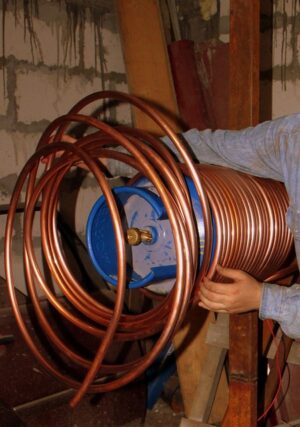Water heaters electric face corrosion and scale buildup issues, impacting performance and longevity. Tank-based systems are vulnerable to mineral-induced scale formation, leading to reduced flow and efficiency. Tankless electric heaters offer a solution by heating water on demand, minimizing scale exposure. Stainless steel, with its superior corrosion resistance, is key for modern electric water heaters, protecting against scale buildup. Chemical treatments manage hard water scaling, maintaining system efficiency. Regular maintenance, including annual draining and smart temp controls, extends lifespan and enhances energy efficiency.
Electric water heaters are a popular choice for homes and businesses, offering efficiency and convenience. However, they face common issues like corrosion and scale buildup, which can reduce performance and lifespan. This article delves into these challenges, exploring how stainless steel construction significantly resists corrosion, preventing damage. We discuss chemical treatments to manage scale and provide essential maintenance tips to ensure your electric water heater’s longevity, keeping it running optimally for years to come.
- Understanding Corrosion and Scale Formation in Water Heaters
- The Role of Stainless Steel in Preventing Corrosion
- Chemical Treatments to Mitigate Scale Buildup
- Maintenance Tips for Longevity: Electric Water Heaters
Understanding Corrosion and Scale Formation in Water Heaters

Corrosion and scale buildup are common issues that can plague electric water heaters over time, impacting their efficiency and lifespan. Electric water heating systems, especially those with tanks, are susceptible to these problems due to the mineral content present in tap water. When water heats up, minerals like calcium and magnesium dissolve, forming a substance known as scale. This scale accumulates on the heater’s internal components, including heating elements and tank walls. Over time, it can lead to reduced water flow, lower heating efficiency, and even failure of the unit.
Residential electric heaters, particularly tank water heaters, often face this challenge. The hot water system’s design means that heated water stays in contact with metal surfaces for extended periods, providing an ideal environment for corrosion. Tankless electric systems, also known as point-of-use heaters or instant electric heaters, offer a solution by heating water on demand, minimizing the time water is exposed to potential scale-forming minerals. This not only reduces the risk of scale buildup but also enhances energy efficiency in home water heating.
The Role of Stainless Steel in Preventing Corrosion

Stainless steel plays a pivotal role in the design of modern electric water heaters due to its exceptional resistance to corrosion and scale buildup. Unlike traditional materials that can succumb to rust and mineral deposits, stainless steel offers unparalleled durability in aggressive water environments. The metal’s natural passivation process creates an inert surface layer, protecting it from oxidative damage and chemical reactions that lead to corrosion.
This property is especially valuable in electric water heating applications, where heated water comes into contact with various minerals and contaminants present in tap water. Stainless steel tank water heaters, both residential electric heaters and larger-scale tankless electric systems (point of use heaters, instant electric heaters), benefit from this characteristic, ensuring prolonged service life and maintaining optimal energy efficiency in electric hot water systems.
Chemical Treatments to Mitigate Scale Buildup

Chemical treatments play a significant role in mitigating scale buildup on stainless steel electric water heaters. These treatments involve introducing specific chemicals into the water to prevent or dissolve mineral deposits, commonly known as scale. Scale formation is a natural process when hard water, rich in minerals like calcium and magnesium, comes into contact with heating elements. Over time, scale buildup can reduce the efficiency of electric water heating systems, including residential electric heaters and tankless electric systems like point of use heaters and instant electric heaters.
By using chemical inhibitors or scalers, homeowners and maintenance professionals can protect tank water heaters and electric hot water systems from scaling. These chemicals either prevent minerals from adhering to the heater’s surfaces or break down existing scale deposits. Energy-efficient heating solutions, such as electric storage heaters, benefit greatly from regular chemical treatments to maintain optimal performance. Homewater heating is a key aspect of modern living, and proper scale prevention ensures that electric water systems operate efficiently and reliably for years to come.
Maintenance Tips for Longevity: Electric Water Heaters

Regular maintenance is key to extending the lifespan of your electric water heater and ensuring it operates efficiently. Firstly, inspect the device for any signs of corrosion or leaks. Cleaning the exterior and vent pipes can prevent buildup and improve airflow. For tank water heaters, drain and flush the system annually to remove mineral deposits and scale, which can reduce heating efficiency.
When it comes to electric hot water systems, insulation is crucial. Insulating your heater can significantly cut down on energy loss and extend its lifespan. Additionally, keeping an eye on temperature settings ensures optimal energy efficiency without unnecessary strain on the system. Many modern residential electric heaters come with smart controls that allow you to monitor and adjust temperature remotely, contributing to energy-efficient home water heating.
Stainless steel electric water heaters offer a durable and efficient solution, thanks to their inherent resistance to corrosion and scale buildup. By understanding the factors that contribute to these issues, homeowners can ensure optimal performance and longevity of their appliances. Combining stainless steel’s protective properties with regular maintenance and occasional chemical treatments can significantly extend the lifespan of electric water heaters, providing clean, reliable hot water for years to come.






